Coming off a brutal first-round loss to the Pittsburgh Penguins in the first round of the 2016 Stanley Cup Playoffs, the New York Rangers seemed to be at somewhat of a crossroads. There was a feeling that unless drastic moves were made, their short-term window to win the Stanley Cup was rapidly closing.
As it turned out, the Rangers opted for some less substantial moves that helped them improve from last year. They ended up with a great opportunity to make a deep postseason run after fortunately sliding into the top wild-card spot and thus moving to the Atlantic Division bracket. After three straight victories to close out the formidable Montreal Canadiens in six games, there was reason for optimism in Rangerstown.
Instead, the Rangers squandered the best aspect of their placement in the Atlantic Division bracket—a more winnable second-round matchup against the Ottawa Senators, as they gave away a couple of games to ultimately lose the series in six.
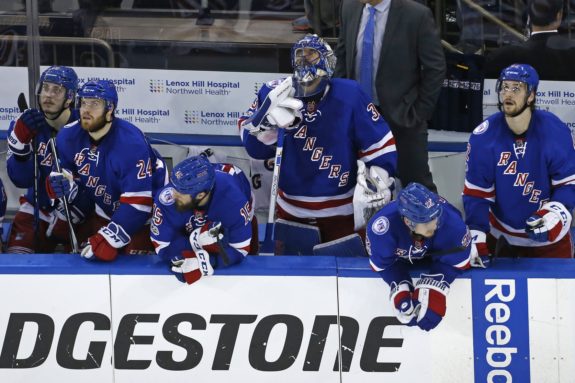
Improvements From Last Year
Last offseason, the Rangers made a few subtle moves that helped restore their identity as a speedy team that is lethal in transition. The signing of Austrian speedster Michael Grabner to a two-year deal with an average annual value (AAV) of $1.65 million might have been the steal of the summer. Grabner pumped in 27 goals and added a disruptive element to the Rangers’ penalty kill that had been sorely lacking since the team traded Carl Hagelin for salary cap reasons.
In the club’s biggest offseason splash, the Rangers also acquired center Mika Zibanejad and a second-round pick from the Ottawa Senators in exchange for the beloved Derick Brassard and a seventh-round pick. While it was tough for the organization to part ways with Brassard, the team got younger with a player who has yet to reach his full potential but has already proven to be a 50-point producer.
Zibanejad suffered a broken leg in November that sidelined him for 25 games, but despite that and a few ups and downs while he was in the lineup, he still managed to record 37 points (14 goals and 23 assists) in 56 contests. He also led the Rangers in playoff scoring with nine points (two goals and seven assists) in 12 games, helping offset the loss of ‘Big Game Brass’.
After Zibanejad and others helped the Rangers dispatch the Habs, the Blueshirts found themselves with a very winnable matchup against the Senators. They understandably entered the series as slight favorites.
Everything Falls Apart
The Rangers were not sharp in Game 1 in Ottawa, yielding 43 shots against in total and 11 high-danger scoring chances during five-on-five play. They did, however, generate numerous shots (35) and five-on-five high-danger scoring chances (nine) of their own. Both teams struggled to finish their opportunities, as Lundqvist and Craig Anderson were outstanding in goal in the series opener. The Senators, though, broke a 1-1 tie late in the game on a somewhat flukey bad-angle goal from star defenseman Erik Karlsson. It was a missed opportunity for the Rangers, but it was not as though they truly deserved to win.
Game 2, however, is the one that the Rangers will probably lament the most, as they were up by two with less than 3:30 remaining. Poor coaching decisions and an inability to properly defend in a five-on-six situation erased what seemed to be a certain Rangers win. The Senators scored twice in the waning minutes to tie it up and eventually won in double overtime on Jean-Gabriel Pageau’s fourth goal of the game.
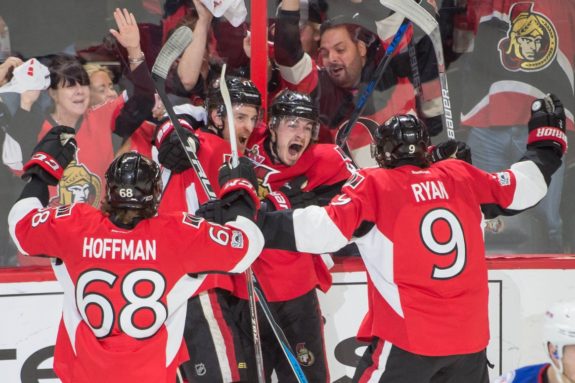
Instead of going back home with a 1-1 tie, the Rangers faced a 2-0 series deficit. They did, though, turn things around with consecutive 4-1 victories at home, looking dominant in the process. The series had seemingly swung in their favor, as those two games showed how overwhelming their attack could be—even against the Senators’ 1-3-1 trap—when they were at their best.
Nevertheless, the Rangers were unable to build on their dominance in Games 3 and 4 any further, as Game 5 proved to be a nightmarish déjà vu scenario. They blew another two-goal advantage before battling back to retake the lead at 4-3 in the third period.
Once again, though, they were unable to close out the game. Once again, sublime rookie defenseman Brady Skjei was stapled to the bench for the last five minutes when he could have helped. Once again, the Rangers lost in overtime. Once again, the Rangers trailed in the series going back home. The difference this time was that their squandered opportunities finally caught up to them, as the Senators seized the chance to close out the series, doing so in Game 6 against a Blueshirts squad that inexplicably didn’t seem to wake up until the game was already halfway over.
With all due respect to the Senators, who boast one of the game’s best players in Karlsson and completely took advantage of the Rangers’ mistakes, they did not really win the series. The Rangers lost it, and now they are watching the playoffs wondering what could have transpired if they were part of the NHL’s final four.
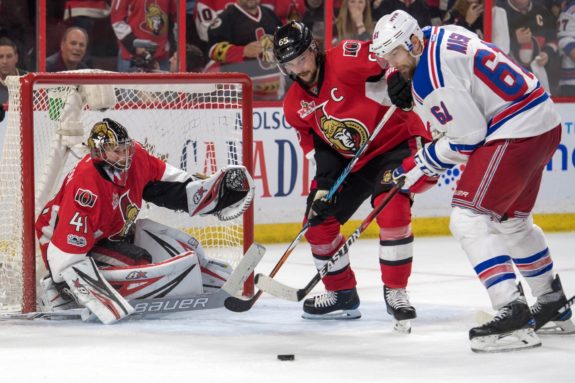
Sure, the Rangers would have been pretty significant underdogs against the Penguins, but their speed against the Pens’ depleted blue line would have given them a chance. With Henrik Lundqvist in net as well, the Rangers always have the ability to steal a series. Against the Senators, however, even Lundqvist couldn’t save the Rangers from their mistakes.
What Went Wrong
Offense
The Rangers scored plenty of goals against the stingy Senators, lighting the lamp 20 times across the six games (an average of 3.33 goals per game). Their biggest advantage all year was their upfront depth, and their second-tier forwards came through for them in the postseason. Grabner had four goals and six points in the 12 playoff games. Jesper Fast stepped up with three goals and three helpers. Oscar Lindberg added three goals, all against the Senators. Jimmy Vesey had a goal and four assists while playing with a noticeable confidence throughout the postseason.
The issue for the Rangers was that they didn’t always get timely scoring from their main weapons when they needed it the most. Their power play was anemic once again, converting only three times in 39 attempts. Derek Stepan, Chris Kreider, Kevin Hayes, and J.T. Miller all had disappointing postseasons and shoulder a lot of that blame. Stepan described his struggles as making him feel like he was stuck in quicksand. Hayes and Miller, however, were even worse, as neither scored a single goal in the playoffs. Coming off 49-point and 56-point regular seasons respectively, the duo could not be relied upon in the postseason.
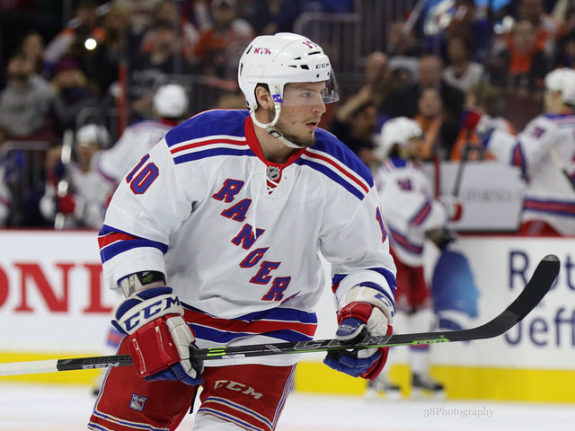
If the Rangers had gotten more contributions from their primary offensive weapons, their attack would have been that much more dangerous with their depth players playing as well as they were. Perhaps the Rangers would have scored a few more timely goals against the Senators, particularly in the overtime periods of Games 2 and 5.
Defense
Of course, with better defense, those overtime periods would not have even been necessary. That was the bigger issue for the Rangers. Even before the season started, it was clear that the Rangers’ defense was their Achilles’ heel, and it reared its ugly head against the Senators after showing some warning signs in the first round against Montreal.
Dan Girardi had a tough time against the Senators. Nick Holden, in a microcosm of his season, created numerous reasons for Rangers fans to hold their breath despite his unforeseen offensive contributions (two goals and two assists in the playoffs after 11 goals and 23 assists in the regular season). Marc Staal, though, might have been the Rangers’ biggest liability on the blue line in the playoffs, as he too looked like he was skating through quicksand.
According to Natural Stat Trick, Staal and Holden had the worst five-on-five scoring-chances-for percentage (SCF) of any Rangers players in the backbreaking Game 2, at 31.58 percent and 33.33 percent respectively. The story was very similar in the Game 5 overtime loss as well, with the duo sporting the worst such marks of any of the team’s defensemen.
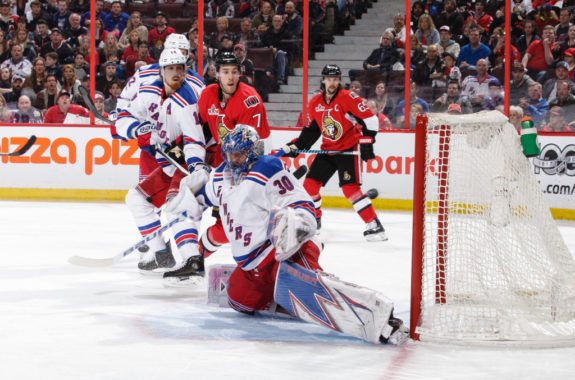
All season, the Rangers were not a good possession team as a result of a back end that did not feature enough mobility or puck-moving ability. The team’s offense helped cover up some of those flaws, but in the playoffs, those flaws proved to be fatal, even with Lundqvist stepping up his game to try to ward off the barrage of shots and scoring chances that came his way.
From the standpoint of goaltending, Lundqvist might have had a down regular season by his standards, but he was great in the playoffs and gave the Rangers a chance. Even with a few soft goals allowed against the Senators, those were blips on the radar of his overall stellar performance, and even more so when viewed alongside the performance of the Rangers’ blue line. Indeed, Lundqvist’s play was among the very best of anyone in these playoffs.
Conn Smythe Watch: Breaking down the leading candidates, dark horse picks, and some very flowery words about EK65. https://t.co/DUFtVYTVqd pic.twitter.com/HZzLmwmipZ
— dom ? nashville ? (@domluszczyszyn) May 11, 2017
Coaching
Adding fuel to the fire of the Rangers’ subpar defensive corps was the inexplicable deployment decisions from head coach Alain Vigneault. Rather than try to minimize the impact of the Rangers’ backend deficiencies, he gave heavy minutes to the weakest links of Girardi, Staal, and Holden, especially in crunch time when the Rangers were nursing late leads.
After everything about Skjei’s performance this year and through the playoffs screamed that he should be given more responsibility, Vigneault instead sat the youngster in crucial late-game moments. Skjei did not play in the final 6:48 of regulation in Game 2. His defense partner, Brendan Smith, did see the ice for the final 5:37 of regulation in that game.
While Smith was put on the ice with Staal in the late stages of Game 5, Skjei once again found himself the victim of Vigneault’s flawed logic that favors veterans over youngsters regardless of on-ice performance. Skjei was on the bench for the final 5:04 of regulation in that game. Vigneault simply never learned from his errors.
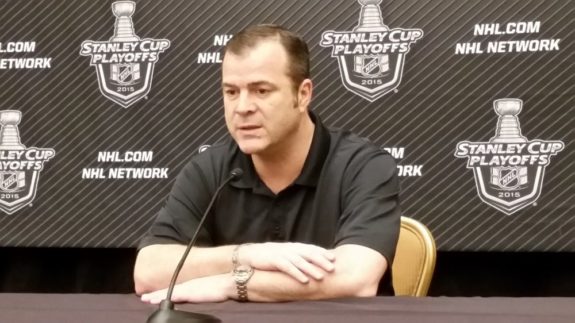
The Rangers’ defense was severely flawed this season. Vigneault, however, made decisions that only served to exacerbate those flaws, as his ice-time decisions were clearly not merit-based. Otherwise, Skjei and McDonagh would have gotten the most minutes on the team. Instead, Skjei had the lowest average ice time of any Rangers defenseman in the playoffs other than Kevin Klein, who only dressed for one game.
The Rangers need to make changes to their defense, but it is arguably more imperative that Vigneault and the front office reevaluate how they determine what makes a good defenseman as well as how to deploy players in such a way to give the team its best chance of being successful. With better decision-making against the Senators, the Rangers would likely be in the Eastern Conference Final for the third time in four years. Instead, they are left to rue what could have been.